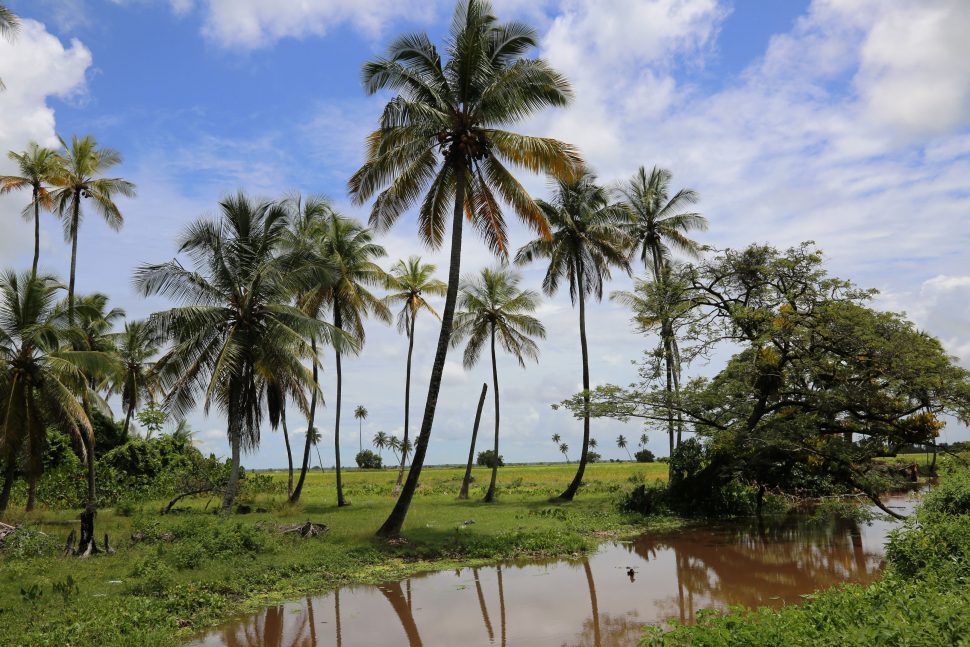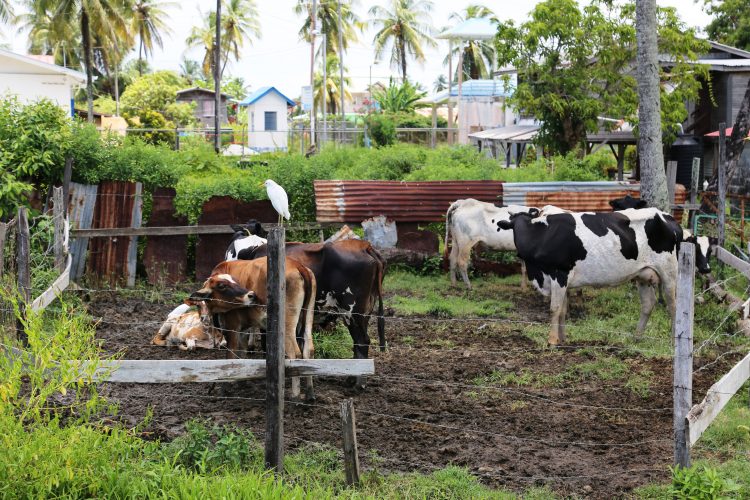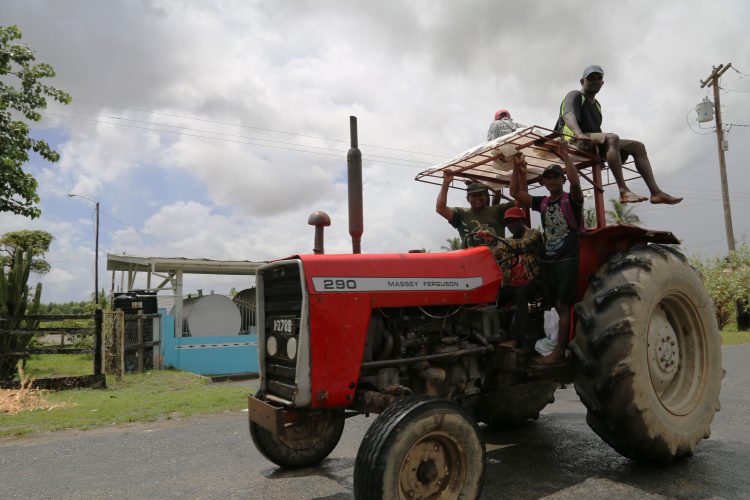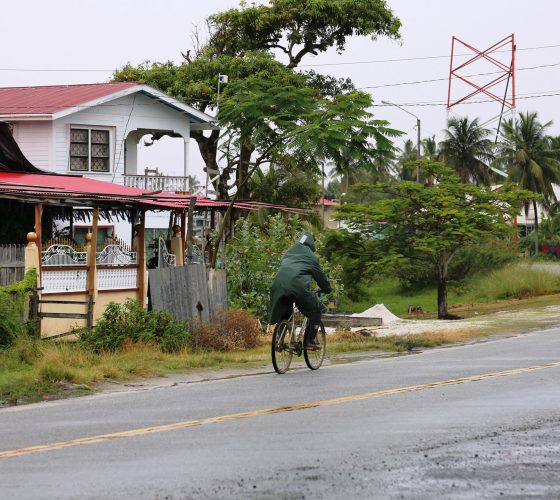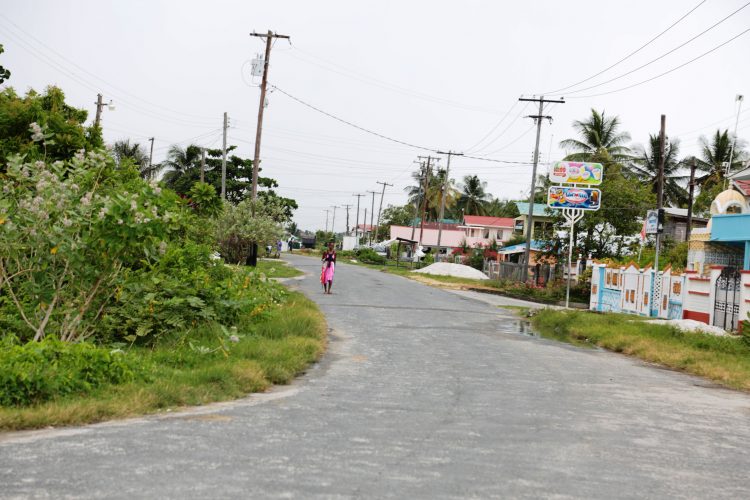Tucked between Lima and Danielstown on the Essequibo Coast is the tiny village spanning a hundred rods in length called Coffee Grove. The village, which now thrives mainly on rice farming, was previously a coffee plantation and this is where it got its name.
To get to Coffee Grove, one travels by speed boat or ferry to Supenaam, then by car or bus to Suddie, then on to Anna Regina where another taxi is taken to the village. Sometimes a vehicle can be taken straight to Anna Regina if one is available, or if one is lucky enough, a bus travelling all the way to Charity allows for a straight drive to the village.
Many of the houses are situated along the road; there is just one street running parallel to the main road. When the World Beyond Georgetown visited, it was raining and just few people were seen standing along the road awaiting transportation to get to their various destinations.
One business that was open is owned by a husband and wife. The wife operates the section named S. Mohamed Variety Store while the husband runs H. Mohamed Tailor Shop. Mr Mohamed was busy working on green Tetrex fabric, which looked like school uniform trousers. Two of his workers were busy themselves seemingly trying to keep to their deadline. They stopped for a short bit to pose for a photo.
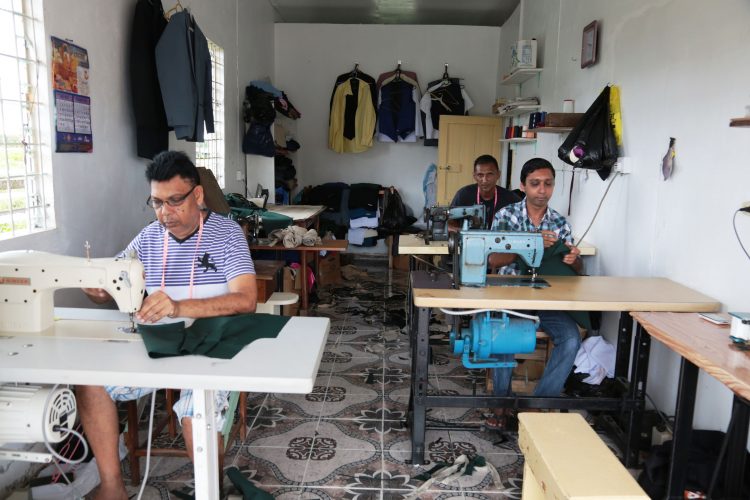
Sheik and Bibi Majeed sat on their verandah, they were having breakfast and making small talk. Bibi hails from Leguan, but Sheik was born at Coffee Grove, along with his parents and his father’s father.
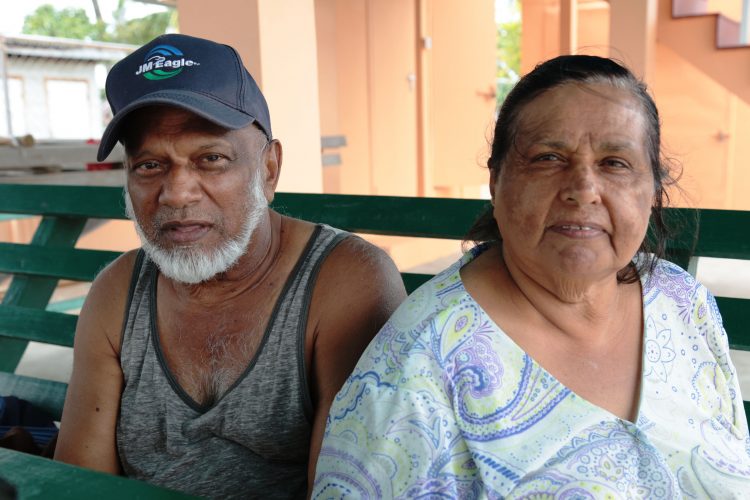
At 75 years old Sheik is a pensioner. As a child, he attended St Agnes Anglican School where he completed his primary education. There was no secondary school along the coast at the time.
The villagers of Coffee Grove were planting rice decades before he was born; he never knew of the village planting coffee. By the time he was ten he was accompanying his parents to the rice fields on weekends to assist, but he never saw himself planting as a means of getting an income. When he was 16 years old, he started working as a carpenter a trade he continued for most of his life. He was one of the carpenters who worked on the Better Hope Primary situated further along the coast.
With the ongoing rainy season, some persons living in the lower parts of the village are affected by floods. The man noted that most of the times, the flooding is caused by the overtopping of drains. A nearby four-foot drain was clogged with foliage and weeds and was said to harbour reptiles of various kinds.
Sheik said unemployment is biggest challenge in the area and asked that this be looked into. He also called for reliable electricity service adding that prior to my arrival the village had been in blackout.
“The people here are friendly. We are like family,” he said. No sooner had he said this than a man pulled up in his vehicle calling for “Cousin Majeed”. It was not his cousin, but a villager named Sampson Nedd who had stopped by to bring him “table mangoes”.
Eddie Lall lives next door to the Majeeds and he is also not related to them but calls the older man ‘grandfather’. “We call each other cousin, or brother, or mamoo or grandfather. We have great respect for each other. We try to maintain the same relationship our parents had with the older folks and others,” Lall said.
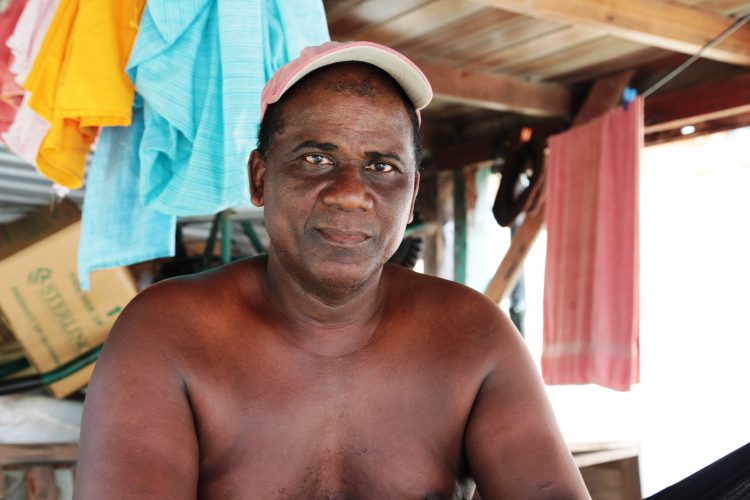
Lall sat in his hammock as the rain poured outside. He shared that he was born in the village and works as a labourer in the backdam. Sometimes he ventures into the interior where he works in the gold mines, but it has been a little over a year since he was there.
Apart from his boyhood days being taken up with his schooling at St Agnes Anglican, his days were also filled with playing cricket at the beach and swimming in the ocean. Today, however, the place where there was once a beach is now thick with mangroves; no one swims there anymore. In the 1980s, Lall joined the army, where he served for three years.
“Nobody ain’t facing problems here. The most problem is unemployment. We plant rice and when crop done we relax and wait for crop to come back on. The flooding is not much of a problem. Not everybody does get flood and for me is only my backyard does flood but once the flood water reach a certain height, they would pump off the water. The trench [the same drain Sheik spoke of] supplies the farms with water but it ain’t clean for like four years now,” Lall said.
Speaking in relation to the youths in the area, he said that the only ballfield close by is situated ten minutes away by foot and described the condition of the field as a “jungle” calling for the ground to be fixed or for Coffee Grove to have its own.
In addition, he said, “No matter where you go, home is home. Everybody live like brother and sister. Everybody live good. We don’t have thieves around. Mostly you might find one, one man drinking but them man nah baddaration.”
Her smile welcomed me before her words did. She knew I was coming as I had sent word before. Everyone here refers to her as Cousin Winnie or Granny Winnie. Her name is Millicent Nedd and she is at the golden age of 94.
She was born in Coffee Grove on December 27, 1923 and bore nine children – eight boys and one girl but the girl passed away some years ago. Her youngest son who was mentioned earlier is Sampson Nedd.
“I grew up in Coffee Grove among the East Indians and chose not to move to Danielstown, an African village where many of my relatives lived because I was respected and loved by my people here and so I stayed on in Coffee Grove,” she said.
Granny Winnie said she loves everything about her village. She grew up with one brother and her mother (both of whom are now deceased) who was the baker in the village. She recalled her mother making different kinds of bread. There was one called ‘break mouth’ which was stiffer than the other breads she made. Her mother also baked ‘choice bread,’ which had currants, and corn bread. Her mother had tried to pass the bakery business on to her, Nedd said, “I told her, ‘no, no, no, no… I see you baking flour by the bags and I ain’t see you got no money so why you want me bake bread?’ However, I knew how to make bread and would bake for my family.”
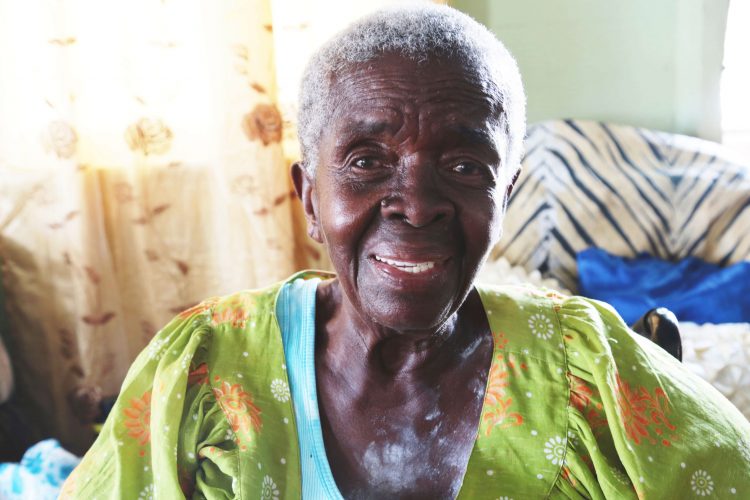
Her first job was helping her aunt who did laundry for some people in Hampton Court. Nedd was given shirts to wash and she said her aunt would check the underarms and collars to make sure they were clean. She often had to rewash the shirts and her mother not liking that her 12-year-old was taken up with such a task stopped her from assisting her aunt.
When she was 18, Nedd got married and even as she recollected the day she smiled sharing that the people of her village spread a white cloth for her to stand on calling her their queen. Whenever there was another wedding in the village, big or small she was expected to be there. After getting married, Nedd said, she worked like never before in the backdam and making ice cream and channa to sell at the Anna Regina market. She boasted that her homemade ice cream was the talk of the town until Banks DIH Ltd took ice cream to the coast. She also worked at the Guyana Rice Board where she and other women sewed the rice and paddy bags. In earlier years she had taken sewing lessons from the wife of Titoo Maraj, the brother of Deroop Maraj who had owned three estates.
Everyone one in the area is famous with Deroop Maraj’s story. One of the oldest buildings in Coffee Grove is where the Marajs lived and operated a rice mill in the same compound. Their father had come from India and settled here. The family eventually took ownership of three estates in Coffee Grove, Danielstown and Sparta. Maraj, Nedd said, had bowed feet and had an illegitimate son with an African girl working in the rice fields who name was Walter. Maraj’s wife, she said, was “not too right in the head”. She recalled going to their shop and his wife running put to play with the children who visited the shop for groceries.
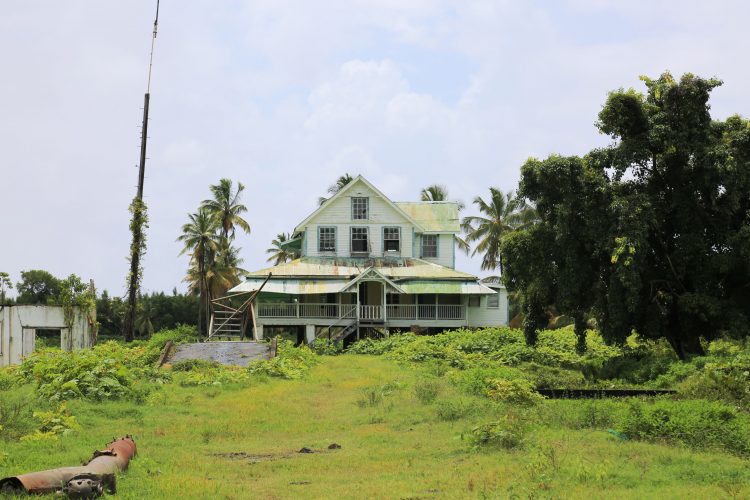
She continued, “Deroop was not nice to his family. He had gotten into politics and played a big thing here. His brother Kadar was studying medicine and had hoped that Deroop would help him out financially since he was well off but Deroop refused and Kadar had studied for a number of years and when it came time to studying surgery, had no money to continue his studies and had to come back home. He was so depressed when he came back that Deroop was forced to take care of him.
“Like most of men in high status, Deroop carried an akia stick. One day when Deroop couldn’t take anymore of having to take care of Kadar, he told him he wish he was dead and hit him in the head with the akia stick. Kadar bled from his nose but didn’t die.
“Another time one of his brothers’ wife had insisted on buying the estate from him but he declined selling to her and later sold to one name Ivor Allen who later sold to Fowl Cock [the call name that the villagers know him by]. Fowl Cock still owns the estate but nothing functions anymore.
“Later when he was older, Deroop travelled to the United States where his son lived to see him, but his son had heard about how he treated other people and told him to go back wherever he came from and take his money with him. Deroop returned brokenhearted and lived like a vagrant, paying people to cook roti and curry for him. He later got sick and died in the hospital. What you do in this life does always follow you.”
Granny Winnie said she taught her daughter to sew and her daughter became better than her at the skill. “I would like to see the young people not be idle. I think a vocational school should be opened here to teach them,” she added.
She recalled that one day when her children were young, she was visited by someone who told her that her son Andrew would stop every morning on his way to school to watch the boys playing ‘choor’ (a game played in the trench) and decided to tell her before he actually ended up in the trench. Nedd left the next morning with Andrew but stopped in at a cousin where she left her things and found a stick. Andrew, she said, was so intent on the boys in the trench that he did not see her, and only realised she was there when the boys in the trench called out to him. Spinning around he begged her to not embarrass him in front of his friends and that he would go to school. Nonetheless, she beat him. Even today, Nedd said, Andrew still calls that the most embarrassing moment of his life. When he finished school, he decided to join the Youth Corps. Sometime later, Nedd travelled to the United States for a visit and knowing Andrew would never be allowed to leave the Youth Corps to visit her, she sent message that she was very ill and wanted to see him. Fearful that his mother would die he flew to the US but found her as fit as a fiddle. Nedd added that the Youth Corps showed up at their home for him but by then Andrew was long gone. Today Andrew lives in San Diego where he works in real estate. Six of her sons live in the US with their families. Only her youngest lives with her but would travel every now and again.
Granny Winnie said she was grateful that all of her children contribute to her well-being and see that persons are there to assist her during the day and night since she is not fully able to help herself with the ligaments in one of her hands being damaged. She talks to her children once a week. “Sometimes they would send money for me and one time I tell them thank you and they say ‘not thank you. We have to say thank you M [M is for mommy] because if it wasn’t for you working so hard we won’t be where we are today’. I have to thank God for my children because without them life would be hard.”
Nedd spends most of her days reading her bible and listening to the news on the television. Monday and Tuesday nights, she watches wrestling. A member of the Trinity Tabernacle Wesleyan Church she is not able to attend services anymore, but her pastor visits often to pray with her.

